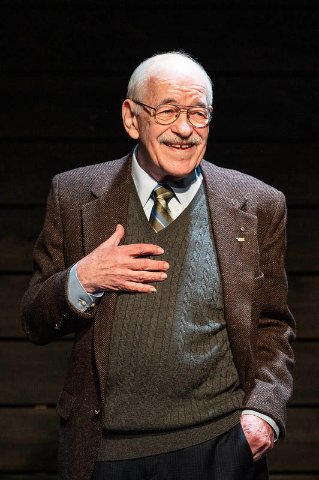The Happiest Man on Earth by Mark St. Germain
Back by Popular Demand at Barrington Stage Company
By: Charles Giuliano - May 29, 2023
The Happiest Man on Earth
By Mark St. Germain
Based on the memoir of the same name by Eddie Jaku
Directed by Ron Lagomarsino
Scenic design, James Noone; Costume, Johanna Pan; Lighting, Maria-Cristina Fuste; Sound and Music, Brendan Aanes.
Starring Kenneth Tigar
St Germain Stage
Barrington Stage Company
May 24-June 17, 2023
World Premiere
There is mordant irony in the title of Mark St Germain’s new play The Happiest Man on Earth, based on a memoir of the same name written by Eddie Jaku (born Abraham Salomon Jakubowicz; 14 April 1920 - 12 October 2021). The book was published when the author was 100.
Played in a warmly engaging, whimsical manner by the emotionally nubile Kenneth Tigar the riveting solo work unravels a daunting conundrum. How is it possible that a Holocaust and Auschwitz survivor identify himself as happy? Not just happy but the happiest man on earth.
Considering the telling of such horrors the notion of happiness is indeed a stretch. Given the skill of the actor and sensitively nuanced direction of Ron Lagomarsino, by the end of an absorbingly mesmeric theatrical experience, we concede that it is indeed plausible.
The horrific circumstances of Jaku’s torment are readily familiar from a plethora of books, theatrical and cinematic treatments. Why then the need for another such work?
That becomes self evident as we interact with a truly remarkable, whimsical persona of a young man caught up in the maelstrom of Nazi Germany. While a victim of Shoah he emerges objective and rational with an uncanny ability to laugh in the face of death.
We are astonished to hear him say “I hate no one, not even him. I do not forgive him. If I forgive I am a traitor to the six million who died. But I must not simply remember them. I also must live for them, the best life I can.”
While we squirm and cringe to learn of the assaults, starvation, and privations he endured, this is a remarkably life-affirming drama. In that sense, the testimony of Jaku is unique and brings new insights and humanity to an all too familiar narrative. His memoir has been translated into many languages and attracted a vast audience.
The challenge was how to transform the book to stage. St Germain has created a clever device. The actor is seen walking into the theater and directly engaging the audience before actually stepping on stage.
He has made a commitment to his two sons to publicly speak of his experiences for the first time. His wife Flore has suggested that he first tell his tale to friends before facing members of the synagogue.
We, the audience, are those “friends.”
As Eddie explains “There are things priceless beyond measure. Family first, family second and family last. And everyone is family.”
Before the war there were some hundred relatives in his extended family. We are chilled to learn that he is the only survivor.
He tells us that during Kristallnacht, it wasn’t just Nazis who assaulted Jews. He recognized neighbors. “These German men were not necessarily evil men” he said “but they were weak and easily manipulated. Over time, they became men who could take children from their mothers, bash their heads against the wall and then go home to their families.”
In Poland, having escaped Auschwitz, he sought help at a farm house. The farmer shot at him and wounded his leg. Jaku concluded that he was safer in the camp and snuck back in.
Ultimately, he was saved by education. Kicked out of school as a Jew he assumed another identity, Walter Schleif. Separated from his family for three and a half years he graduated and was accepted into the National Precision Engineering Union, with First Honors.
In the camps those skills made him an “Economically Indispensable Jew.” That designation three times reprieved him from the gas chamber. He survived as long as he was physically able to work.
During the winter in each barracks some ten to twenty froze each night. Some opted for suicide by grabbing the electrified barbed wire fence. The despair was so harrowing that even after the camps were liberated many took their lives.
This world premiere has been given a terrific production. The scenic design by James Noone is sparse but impactful. The intimate stage is surrounded by wide, dark stained planks with thin light emitting separations. They evoke drafty barracks. The effects of war are aptly conveyed by the precise lighting of Maria-Cristina Fuste and sound design of Brendan Aanes. With an economy of means they enhance the gestures and responses of Tigar. Our imagination is prompted to evoke the unthinkable.
Given all that he had endured there was a lump in my throat as Jaku concluded, “Every breath is a gift. There are many hard days, but even on those days, we are so lucky to be alive. Today, Flore and I are surrounded by our two sons, Michael and Andre, our four grandchildren and our five great grandchildren.”
Family, yes it’s all about family. That’s why Eddie Jaku was the happiest man on earth.

